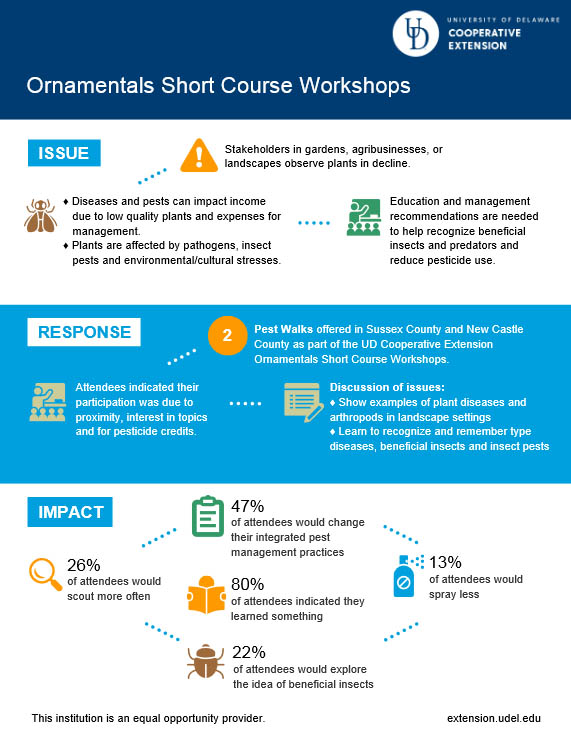
Ornamentals Short Course Workshops (2018)
- Health & Well-being
-
Agricultural Programs
- Agribusiness
- Animal Science
- Beginning Farmer Program
- Commercial Crops
- Commericial Horticulture
- Delaware Soil Testing Program
- Disease Management
- Farm Vitality and Health Project
- Irrigation
- Nutrient Management
-
Insect Pest Management
- Insect Trapping Program
- IPM Hot Topics
- Commercial Field Crop Insect Management
- Commercial Field Crop Disease Management
- Commercial Fruit & Vegetable Crop Pest Management
- EIPM Implementation Projects
- Pollinators
- Research and Extension Demonstration Results
- Brown Marmorated Stink Bug (BMSB) Management, Research, and Resources
- Publications
- Pesticide Safety Education Program
- UD Plant Diagnostic Clinic
- Variety Trials
- Weed Science
- Certified Crop Advisor Program
- Poultry Biosecurity
- 4-H
-
Horticulture
- Climate Variability and Change
- Delaware Soil Testing Program
- Forestry
- Lawn and Garden
- Master Gardeners
- Master Naturalist Program
-
Nutrient Management
- Nutrient Management Certification
- Continuing Education for Nutrient Management
- Nutrient Management Planning Resources
- Commercial Nutrient Handler Resources
- Poultry Litter and Manure Management
- Turf Management
- Agriculture Notebook
- Horticulture Handbook
- Agriculture & Horticulture Handbooks
- Crop Production
- Soil Fertility
- Delaware Climate Change Coordination Initiative (DECCCI)
- Salt Impacted Agricultural Lands

ISSUE
Pest Walks June 6, 2018 and June 20, 2018 – Brian Kunkel, Nancy Gregory, Tracy Wootten and Carrie Murphy Stakeholders in gardens, agribusinesses, or landscapes observe plants in decline. Diseases and pests can impact income due to low quality plants, loss of plants and expenses for management. Plants are affected by pathogens, insect pests, environmental/cultural stresses, or a combination of factors. Management recommendations may be very specific. People may not recognize beneficial insects and predators.
RESPONSE
Attendees at two pest walks offered in Sussex County and New Castle County, Delaware, indicated that they attended due to proximity, interest in topics and for pesticide credits. A Qualtrics survey was distributed to attendees via email a few days after the workshop. We received 17 responses from 26 attendees, to a short and concise survey. In situ and hands-on learning opportunities are known to help people learn to recognize and remember type diseases, beneficial insects and insect pests. Through UD Cooperative Extension Short Course training, participants see examples of plant diseases and arthropods in landscape settings.
IMPACT
There was a range of knowledge before the classes, but 80% indicated that they learned something by their changed responses to a few fact questions such as one about integrated pest management (IPM) involving scouting for both pests and predators. With that increased knowledge, attendees agreed that more targeted use of insecticides was the best strategy. When asked if they would change their IPM practices, 47% indicated they would definitely do so. What changes they might make showed a bit more variation:
- 26.67% would scout more often
- 8.89% would plant resistant cultivars
- 11.11% would explore all possible problems
- 22.22% would explore the idea of beneficial insects
- 13.33% would spray less
- 15.56% would analyze recent weather patterns and determine how they may affect your plant(s)
All attendees learned something new, with 80% strongly agreeing they learned something new, and the remaining 20% somewhat agreeing. Most (80%) will have the opportunity to share new knowledge with others, including colleagues, employees, and students. The “Train the Trainer” aspect of these small group learning opportunities is therefore very valuable. For 63% of attendees, the walk was their first pest walk short course, indicating that new audiences continue to be reached, although walks are done every year.
The University of Delaware is an Equal Opportunity Institution and Provider. Visit UD’s Office of Equity & Inclusion to learn more.
Additional Links
531 South College Avenue Newark, DE 19716 (302) 831-2501
